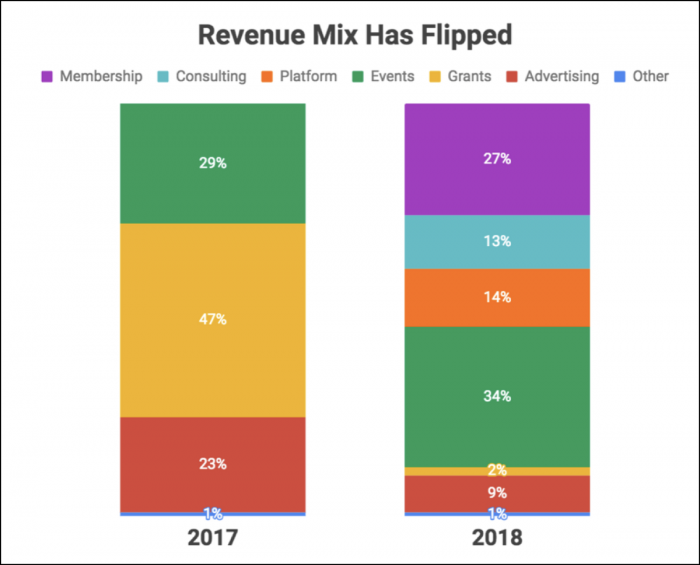
Spirited Media — the startup network of three city-centered and millennial-focused news sites, one of the brightest hopes for a digital-native, sustainable, replicable model for local news — is now Spirited Media the consultancy.
On Wednesday, the company announced the sale of one of its sites, Denverite, to Colorado Public Radio and said it was shopping around its other two (Philadelphia’s Billy Penn and Pittsburgh’s The Incline). Spirited’s vice president of strategy Chris Krewson acknowledged they’re throwing in the towel on trying to run local news sites themselves in favor of consulting others who want to.
Now, perceptive reader that you are, you may be wondering what’s next for Spirited Media’s other newsrooms — Billy Penn, which launched in Philadelphia in 2014, and The Incline, which launched in Pittsburgh in 2016. Well, we are also in talks with potential local buyers in those cities as well, and we’re hoping to have announcements on their futures in the coming weeks.
Why? Well, that’s the path that’s emerged for Spirited Media, which has already pivoted a couple of times, as every startup must. The latest pivot reflects the reality of being a startup in these difficult times for the local media business: There is more money out there for companies like ours to earn helping others do what we do via consulting than continuing to raise money to expand into new markets.
We're also in talks with buyers for @theinclinepgh and @billy_penn, in Pittsburgh and Philly. Why? Well, you may have seen the news about big companies like McClatchy and Gannett and Tribune trying to purchase each other. It's a bad time to raise money as a small media company.
— Chris Krewson (@ckrewson) March 6, 2019
Spirited Media emerged from the implosion of Digital First Media’s Project Thunderdome. Jim Brady — a veteran of local online news after stints at The Washington Post, AOL, and TBD — made a bet on developing civic local news for urban, younger news consumers: starting with Billy Penn in 2014, expanding to Pittsburgh in fall 2016, merging with the investor-bankrolled Denverite in spring 2017, and recruiting investments from Gannett and others. In the short years since, Spirited Media was forced to lay off reporters, pivoted from advertising and events, and grew membership to nearly a third of its revenue in one year — but was only able to raise about half of a $1.5 million funding round. (Gannett’s a little busy at the moment.)Cliff Notes version: Local news is hard. Fundraising for local news is harder. But we've started making considerable $$$ helping others with digital strategy, editorial and product consulting, so we're focusing on that and looking to leave our sites in reliable hands.
— Jim Brady (@jimbrady) March 6, 2019
“The sites still need more support than we can provide right now,” Brady tweeted. I asked Krewson to elaborate: “Runway,” he said simply. “With membership, they can more than pay for themselves, but we couldn’t give them the time that they needed.”
Brady said the company underprioritized marketing and hiring a chief revenue officer: “When you’re trying to build a membership program you need to put people in the top of the membership funnel.” (Newer news sites, especially nonprofits, tend to grossly underinvest in the business side of the journalism operation, research and hard-won experience have both found.)
Denverite, the first membership program in Spirited’s portfolio, is moving steadily along with nearly 1,200 signed up for membership (out of about 2,500 across all three sites). In August, Brady told us 60 percent of their 1,500 total customers opted for recurring contributions, with the average annual contribution around $115. And Denverite’s membership push isn’t over at CPR: “We’ve still got to work toward building up membership to cover our journalists’ salaries,” newly promoted editor Ashley Dean wrote in the site’s post announcing the move. Many news organizations are gunning for reader revenue in the form of participatory memberships (as opposed to paywalled subscriptions), most notably The Correspondent. BuzzFeed News also launched memberships before its layoffs as a for-profit company struggling to figure out a financial path forward, though Spirited’s core pitch was its local community versus a national audience. Both Krewson and Brady said they regretted not jumping into membership earlier. “I think that’s the biggest mistake we made,” Brady said; Krewson felt “we got seduced by the success we had in display advertising.”Krewson said they could have chosen to “cut to keep things running to try to get to profitability, but when you’re running into reporters, there’s not a path where you’re going to continue building members if people see what they love withering away.”
The company also drew on its events strategy, which Brady had pushed as part of connecting younger audiences to local news, to boost its membership appeal. The trio of sites were organizing 90 to 100 events a year, but convincing advertisers to sponsor was still tricky, he said. From Brady’s September pitch:

The local news space — where the journalism losses have piled up most quickly in the transition to digital — has faced particular headwinds. Whereby.us, another industry local-news hopeful focusing on metropolitan millennials, raised $1.25 million from investors including local followers crowd-investing. But less than two years ago, it planned to have sites in 12 cities by the end of 2018 and 25 by the end of 2019. Today, it has four, with no new sites in nearly a year.
The Charlotte Agenda was another startup that found initial success, expanding from its hometown to a second site in Raleigh. But that shut down after four months, and the company hasn’t tried expansion in the two-plus years since.
There are other bright spots, to be sure, but they’re disproportionately focused in the most appealing markets (well-off suburbs, college towns) and, aside from the low-cost/high-volume approach of Patch, they generally haven’t proven replicable from city to city and town to town. Which is one reason Spirited’s leaving the market is particularly, well, dispiriting.
“Local news scared certain investors outside of the strategic space. They said, ‘we love local journalism, but it just scares the hell out of us,'” Brady said. Local investigative outlets will rely on foundation grants, he thinks, and block-level social networks like Nextdoor will keep going. It’s the market segment between those, though — including classic watchdog reporting on city and metro-level governments — he worries about most. “That’s the space newspapers occupy, but my fear is that whole donut hole is going to be vacated. You’re going to have micro-community sites with 72 lost-dog stories a day and [you’ll have] investigative reporting — but most of the things between those are going to struggle if we can’t figure out the model.”
Now the sites’ missions will continue on with public radio, in at least Denver, and potentially other civic-minded groups in Pennsylvania. Spirited Media consulting will specialize in user-first local news — “we’re trying to not to think about what a news organization needs to do online, but what people in this area need digitally and how local media can provide it,” Krewson said — with projects in the works with Graham Media Group’s TV stations and public radio station WBEZ in Chicago.
Personally, it's not the outcome I wanted. But I'm happy that what I helped build and worked on has value. /end
— Chris Krewson (@ckrewson) March 6, 2019